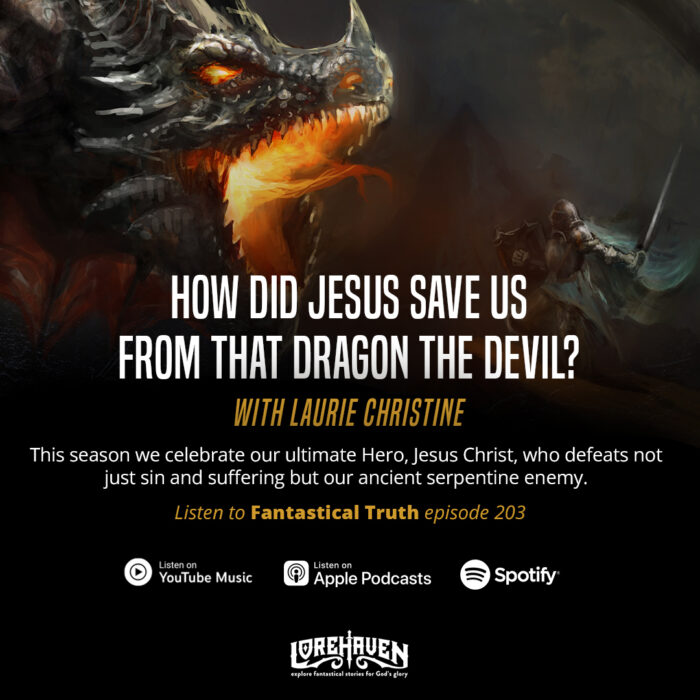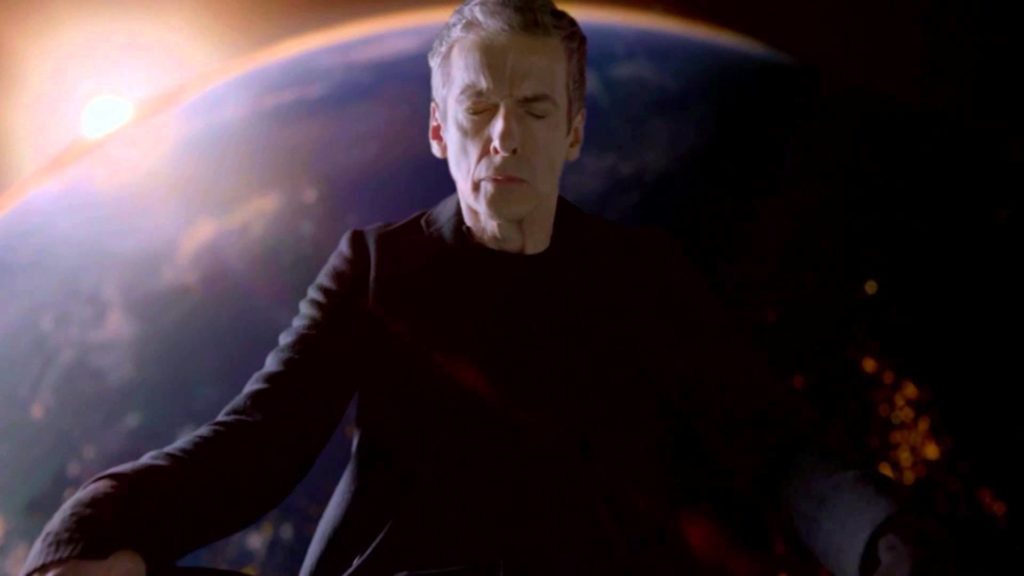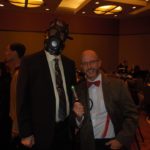Abandoned By The Lonely God
“Fairy tales are more than true – not because they tell us dragons exist, but because they tell us dragons can be beaten.”
So goes Neil Gaiman’s paraphrase of G. K. Chesterton. Both Gaiman and Chesterton, and many others besides, recognized the power of art to give hope to the hopeless. But, Gaiman and Chesterton had very different visions of where this hope might come from. Where Gaiman’s paraphrase leaves our salvation in the passive voice, Chesterton continues:
What the fairy tale provides for him [the child] is a St. George to kill the dragon. Exactly what the fairy tale does is this: it accustoms him for a series of clear pictures to the idea that these limitless terrors had a limit, that these shapeless enemies have enemies in the knights of God, that there is something in the universe more mystical than darkness, and stronger than strong fear.

Knights of God are generally assumed to be competent.
Chesterton trusted God, and the “knights of God,” to keep the darkness at bay. But who kills Gaiman’s dragons? His paraphrase of Chesterton was meant to sum up the experience of Coraline, a young girl who had to face a strange world, and the monsters in it, with only her own wit and resilience. In this story, and many like it, what is more mystical than darkness, and stronger than strong fear, is the self.
Coraline’s victory comes after all of the adults in her life are defeated. Why could Coraline count on herself when her relatives couldn’t? If we were faced with the same situation, how could we make sure we came out as resourceful Coralines and not hapless fairy tale grown-ups? Calling the story’s assurance into question this way is narratively out of bounds and not at all charitable, but quite difficult to avoid once you’ve thought of it.
This happens over and over. People need faith, and when they cannot have it in God, they will have it in something, even if this faith does not stand scrutiny.
Is the Doctor a good god?
Take Doctor Who. People have faith in Doctor Who. Not just as entertainment, but as an idea. Sometimes this idea is that life is worth living and people are worth loving even when the universe is big and scary and dangerous and at the end rewards the just and the wicked alike with a big fuzzy soup of heat death. As Craig Ferguson put it, “the triumph of intellect and romance over brute force and cynicism.”

Not pictured: the triumph of intellect and romance.
Precisely why this triumph occurs, and who can be trusted to provide it, is an exercise left to the viewer, and one that arguably has its roots in bad taste.
But we shall proceed anyway.
The problem begins with how the audience is supposed to relate to the Doctor. The human companions provide a natural audience viewpoint, making their protector a good fit for a “knight of God.”
But, the Doctor could never be a knight of God. Gods in the universe of “Doctor Who” are nothing but trouble, at best the benign illusions of primitive peoples and at worst active deceptions by malevolent powers.
Though he would never accept the label, The Doctor is closer to being a god himself, facing every conflict with an overwhelming technological advantage and hardy alien physiology that makes the Christ parallels too gauche to reference directly. But the Doctor exists in a universe, and for an audience, which believes it is too grown-up for gods. Surely the message isn’t that we are supposed to sit back and wait for God by another name.
So, perhaps we are meant to become The Doctor ourselves. After all, it is his intellect that saves the day, and his panache and resourcefulness that we might be inclined to imitate.
But this, too, is hardly a comforting aspiration. Whether it’s a wand in the shape of a screwdriver or knowing just which button to push, The Doctor’s intellect is so far beyond our own that the writers generally have no choice but to depict it as magic.
This abstraction often undermines the show’s claim to a more romantic view of the universe. To the people on the receiving end, it makes little difference whether they were destroyed by a word salad of Star Trek particles or a common cruise missile. When The Doctor wraps his enemies in chains and drops them down a shaft, the fact that his bindings are made from impossible sci-fi metal doesn’t save him from looking like a common Mafioso.

You come to me, on the day of my regeneration, and ask for mercy?
The story’s writers even go so far as to make The Doctor’s intelligence utterly impossible for a human. One of the companions temporarily gains his brainpower through a science miracle, only to have to seal it up later because it was too much to handle. On this point, the writers could hardly be clearer: even if through some inimitable fluke you managed to become as smart as The Doctor, you could never handle it.
I suspect, even in Chesterton’s imagination, that the inspiring figures of the “knights of God” were not meant to inspire in perfectly logical ways. Fairy stories don’t require real dragons to invoke real fear, and their knights are still quite inspiring as romantic abstractions rather than diligently rendered historical feudal lords.
But the dragons in “Doctor Who” aren’t always fictional. On the edges of “Doctor Who”’s treatment of the universe is the Lovecraftian notion that the universe is dark, vast, and full of forces utterly indifferent to human flourishing. While we are not asked to believe in literal Daleks, we are left open to the possibility that something equally dangerous is out there, or here already, and we’re only wrong in the particulars.
Beyond that, loneliness, listlessness, selfishness, even the universe’s crippling vastness and inevitable ignominious end—there is no suggestion that we are meant to believe these bogies are limited to the screen.
Where, then, is the place for faith? In waiting for The Doctor we know will never come? Or in trying to become that which we can never be? These questions will be asked, but, in the realm of The Doctor, they will never, ever be answered. Silence will fall.





































Thoughtful article, thank you.
I think the Doctor is supposed to represent an idealized humanity (though he’s an alien), not both God and man in hypostatic union, but a human being plussed up to the max, where he is, as you stated, in effect a god. He is in effect a super hero, albeit a British one, so his powers are no so much physical and don’t prevent him from being relatively ordinary in appearance.
Note though that the ancient Pagans also portrayed their gods as essentially being human in rivalries, interests, and desires. Just plussed up and powerful humans. We create gods in our own image…whereas the Almighty of the Bible is quite different from us.
The messianic aspect of Doctor Who, very strongly shown in the end of the one season where the entire planet is essentially praying to him as he transforms from Dobby the Elf into David Tennant, is one of the more annoying aspects of the show.
Yes, and all the more so because it’s so completely unnecessary to the premise of the show. Most of Classic Who never deified the Doctor, in fact quite the opposite: he was repeatedly shown to be not only entirely fallible but not at all impressive or imposing to his enemies, much less a legendary figure whose reputation would tempt them to either terror or worship. Most of the people he either helped or fought against had no idea who the Doctor was or what to make of him, and were apt to grossly underestimate him more often than not. Even with the Seventh Doctor, who started out silly and gradually turned into a darkly mysterious figure with hints of a buried past, his legendary status was tied to Gallifrey and the possibility that he might be the regeneration of some ancient Time Lord hero, not something that would impress anyone who didn’t know about the Time Lords.
So much as I’ve enjoyed a lot of the new series, every time a character gives some over-the-top speech about the Doctor being “…like fire and ice and rage. … like the night, and the storm in the heart of the sun. He’s ancient and forever. He burns at the center of time and he can see the turn of the universe,” I want to stick my finger down my throat. Because that is pure “I grew up watching DOCTOR WHO and loved it, therefore the Doctor is a GOD” fanboy nonsense and has nothing to do with what made either the Doctor or his adventures compelling in the first place.
The ‘Lonely God’ title was really played up near the end of Davies’ era (season four and specials), but Moffat loved playing with it and ultimately, explicitly subverting it with Twelve’s declaration in the season eight finale.
“Thank you! I am not a good man! I am not a bad man. I am not a hero. And I’m definitely not a president. And no, I’m not an officer. Do you know what I am? I am an idiot, with a box and a screwdriver. Just passing through, helping out, learning”
The thing is, though, stories are about humans and victories tend to arise from human triumph over adversity in a story. If God or a stand-in for Him came and saved the day, the reader/viewer would feel cheated, like they got sprung with a Deus ex Machina when they were expected the brave character they became attached to to save his/herself based on all the clues of his/her bravery they’d received up to now.
Granted, Christ is the universe’s greatest Deus ex Machina…but if (forgive me) we analyze it from a purely narrative perspective, His sacrifice is well set-up by His life, teachings, and sacrificial death, so it feels satisfying to the reader (of course Christ is infinitely more valuable than narrative satisfaction, but just for the sake of argument here). It’s a tricky balance in Christian fiction and one I think about as a writer…faith is rescue, but how do you portray rescue without making your character look like an idiot that needs to be saved by an unlikely deus ex machina?
Disclaimer: I am not personally familiar with Doctor Who beyond the first 6 episodes of the reboot. Just making general comments about the nature of stories.